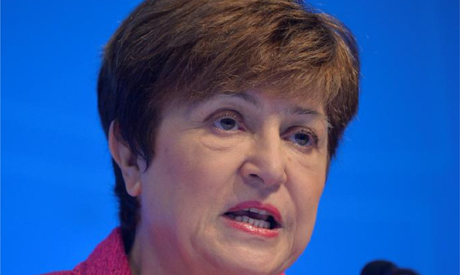
FILE PHOTO: International Monetary Fund (IMF) Managing Director Kristalina Georgieva. Reuters
Emerging markets, excluding China, are expected to witness a per capita cumulative loss at 20 percent by 2022, while the advanced economies' loss is projected to be at 11 percent as a result of the ongoing challenges caused by the pandemic, said Managing Director of International Monetary Fund (IMF) Kristalina Georgieva.
Georgieva made her statements during the curtain raiser virtual event on Tuesday. The event was held to announce the key theme and main topics that will be discussed during the upcoming IMF and World Bank spring meetings, kicking off officially on 5 April.
Georgieva said that such loss is increasingly powered by two engines which are the US and China.
She added that the global economy is on firmer ground and that millions of people are benefiting from vaccines against the virus. Vaccines however, are not yet available to everyone everywhere, causing the global economy to be at risk.
“Too many people continue to face job losses and rising poverty. Too many countries are falling behind," said Georgieva.
Georgieva revealed that the upcoming IMF and World Bank spring meeting will concentrate on discussing the right ways to provide fair shots for all. While also discussing the policies that are critical to securing recovery from the pandemic's repercussions.
For the global economic outlook, Georgieva unveiled that the IMF has revised its projections in this regard for 2021 and 2022. New projections will be included in the updated report of the world economic outlook that will be released next week during the spring meetings.
“In January we expected global growth at 5.5 percent in 2021. We now expect further acceleration partly because of additional policy support, including the new fiscal package in the United States; and partly because of the expected vaccine-powered recovery in many advanced economies later this year," Georgieva added.
She revealed that governments across the world - during the ongoing crisis - have pumped $16 trillion in fiscal action and a massive liquidity injection by central banks to counter the severe economic implications of the pandemic.
IMF research, released on Monday, showed that low-income countries have to deploy some $200 billion in five years to counter the pandemic and another $250 billion to return to the path of restoring higher income levels.
Without these measures, the 2020 global economic contraction would have been at least three times worse and could have paved the way for another great depression, said Georgieva.
Such measures also averted the world to face another global financial crisis.
According to Georgieva, investing in green infrastructure, digitalisation, supporting small and medium-sized enterprises (SMEs) as well as providing vaccines for all, are potentials for the global economy to protect its recovery going forward.
She added that coordinated green infrastructure combined with carbon pricing, could boost global GDP over the next 15 years by 0.7 percent and create millions of jobs.
Short link: